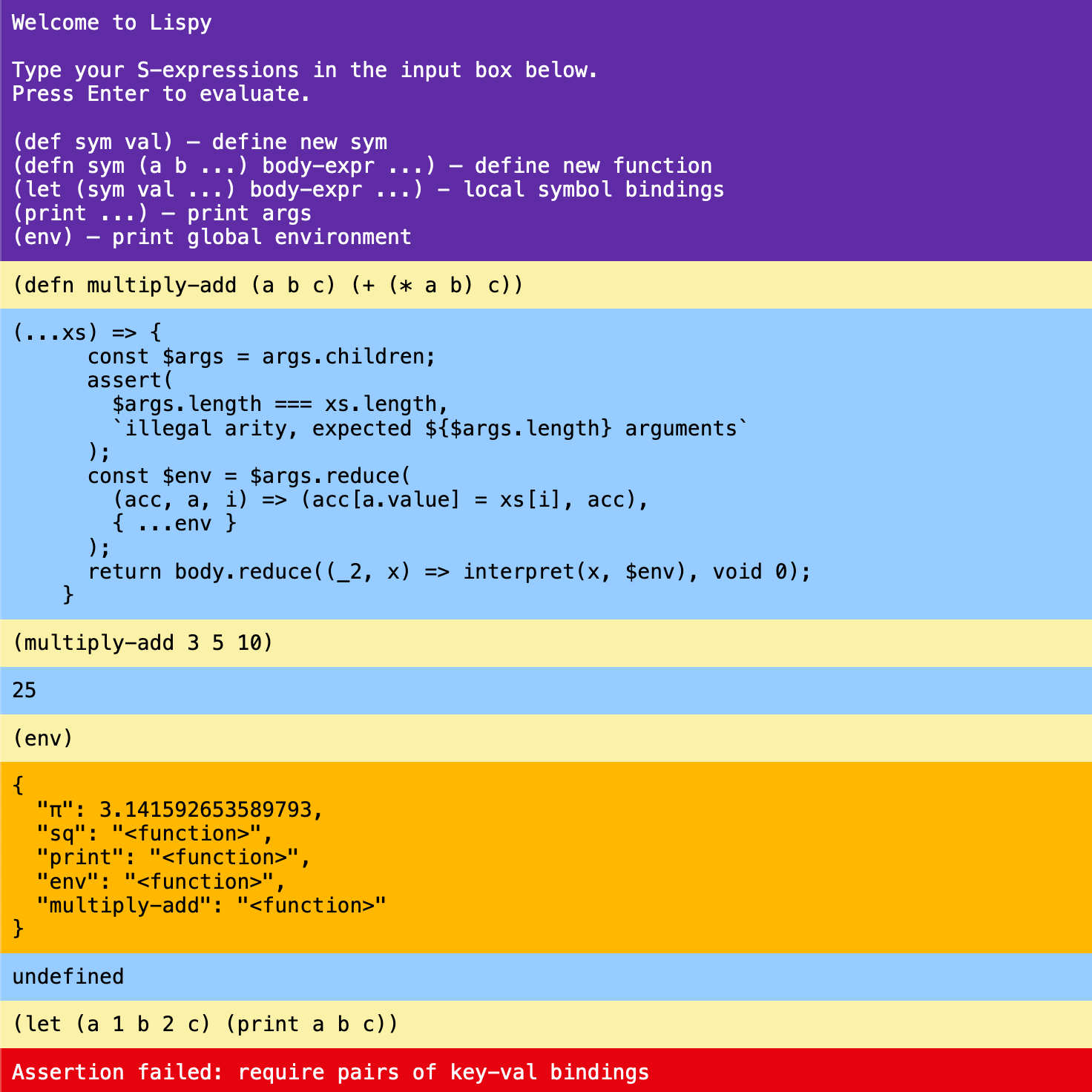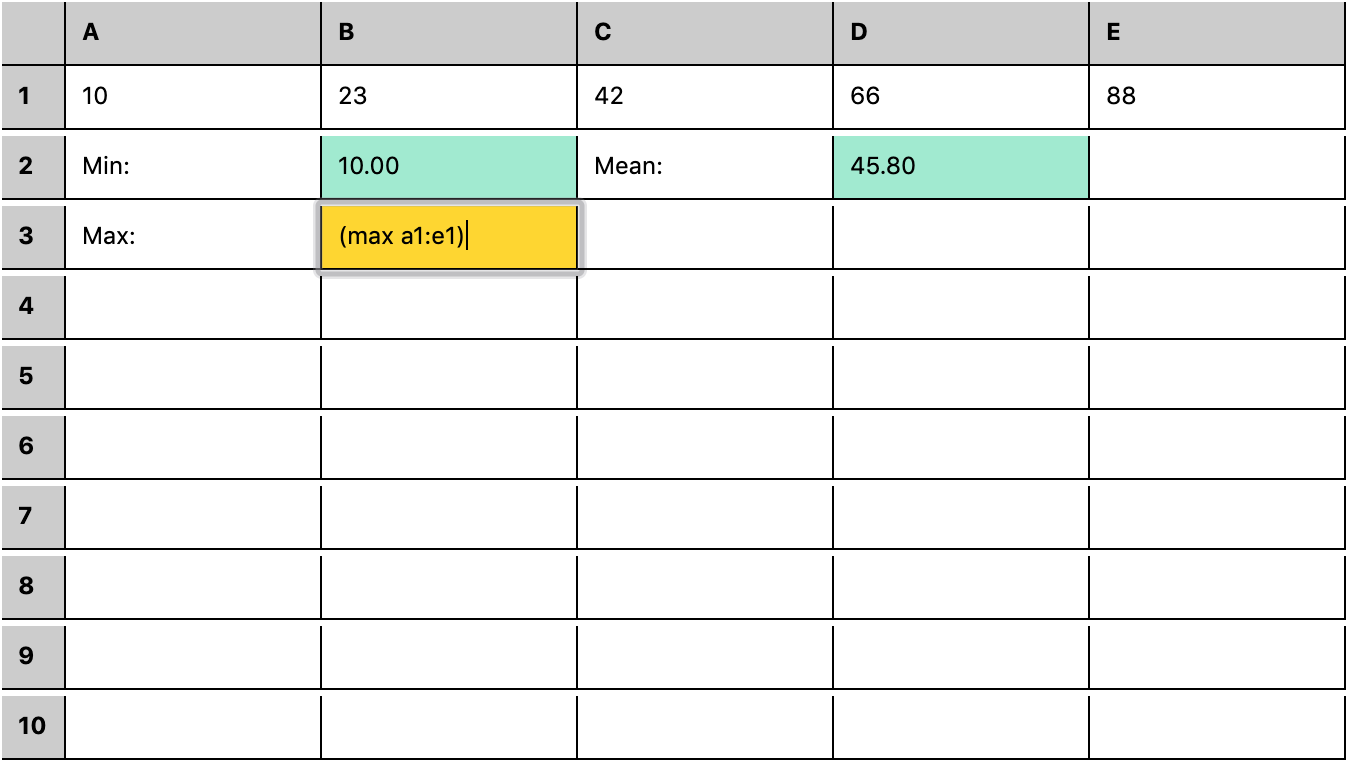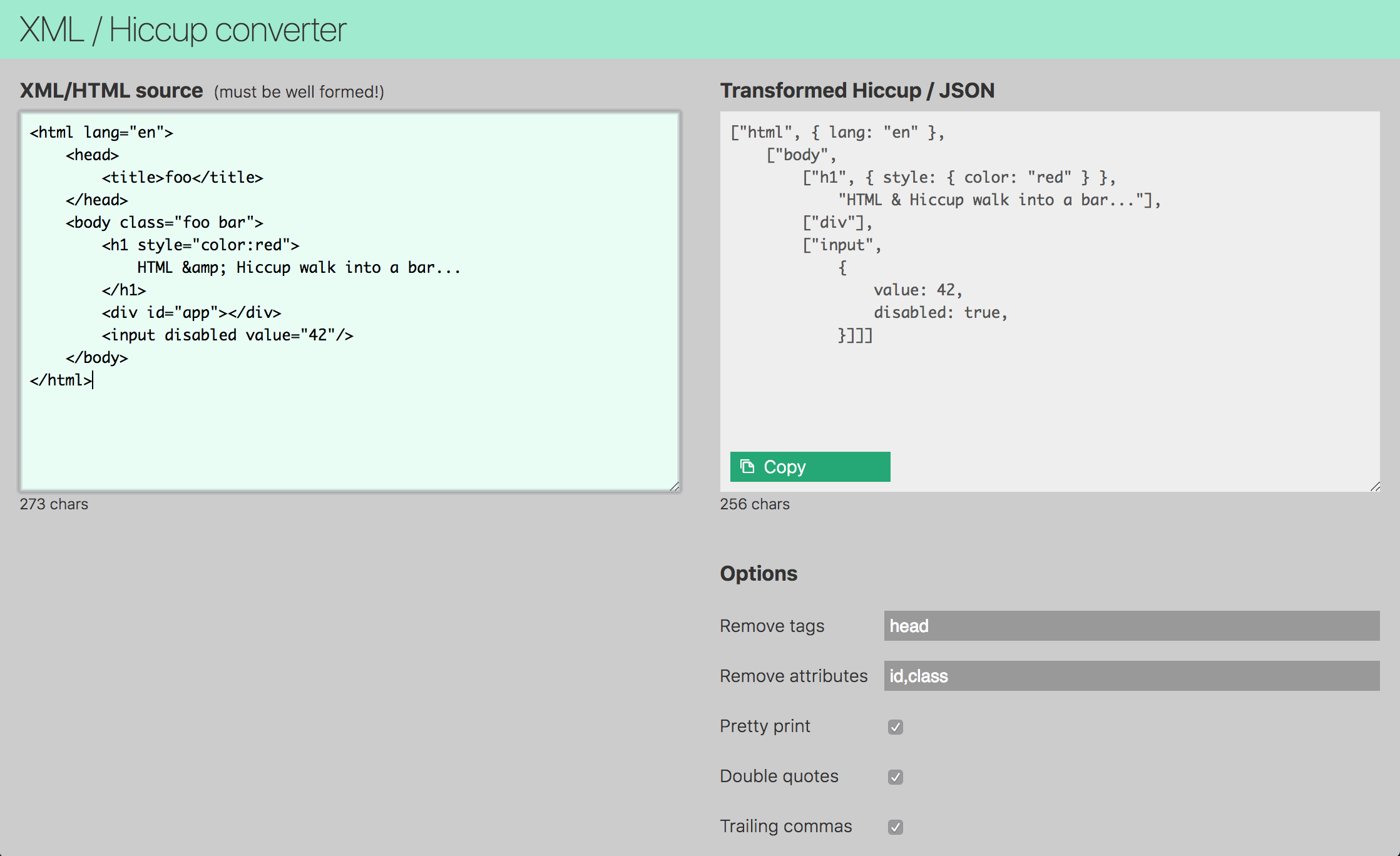



This project is part of the
@thi.ng/umbrella monorepo and anti-framework.
About
Dynamically extensible multiple
dispatch via user
supplied dispatch function, with minimal overhead and support for
dispatch value inheritance hierarchies (more flexible and independent of
any actual JS type relationships).
Status
STABLE - used in production
Search or submit any issues for this package
Installation
yarn add @thi.ng/defmulti
ES module import:
<script type="module" src="https://cdn.skypack.dev/@thi.ng/defmulti"></script>
Skypack documentation
For Node.js REPL:
const defmulti = await import("@thi.ng/defmulti");
Package sizes (brotli'd, pre-treeshake): ESM: 781 bytes
Dependencies
Usage examples
Several demos in this repo's
/examples
directory are using this package.
A selection:
| Screenshot | Description | Live demo | Source |
|---|
 | Browser REPL for a Lispy S-expression based mini language | Demo | Source |
 | rstream based spreadsheet w/ S-expression formula DSL | Demo | Source |
 | XML/HTML/SVG to hiccup/JS conversion | Demo | Source |
API
Generated API docs
defmulti()
defmulti returns a new multi-dispatch function using the provided
dispatcher function. The dispatcher acts as a mapping function, can take
any number of arguments and must produce a dispatch value (string,
number or symbol) used to lookup an implementation. If found, the impl
is called with the same args. If no matching implementation is
available, attempts to dispatch to DEFAULT impl. If none is
registered, an error is thrown.
defmulti provides generics for type checking up to 8 args (plus the
return type) and the generics will also apply to all implementations. If
more than 8 args are required, defmulti will fall back to an untyped
varargs solution.
The function returned by defmulti can be called like any other
function, but also exposes the following operations:
.add(id, fn) - adds/overrides implementation for given dispatch
value.addAll(impls) - add/override multiple implementations (given as object,
with keys referring to dispatch values).remove(id) - removes implementation for dispatch value.callable(...args) - takes same args as if calling the
multi-function, but only checks if an implementation exists for the
given args. Returns boolean..isa(child, parent) - establish dispatch value relationship hierarchy.impls() - returns set of all dispatch values which have an implementation.rels() - return all dispatch value relationships.parents(id) - direct parents of dispatch value id.ancestors(id) - transitive parents of dispatch value id.dependencies() - returns iterator of all dispatch value relationship pairs
Dispatch value hierarchies
To avoid code duplication, dispatch values can be associated in
child-parent relationships and implementations only defined for some
ancestors. Iff no implementation exists for a concrete dispatch value,
defmulti first attempts to find an implementation for any ancestor
dispatch value before using the DEFAULT implementation.
These relationships can be defined via an additional (optional) object
arg to defmulti and/or dynamically extended via the .isa(child, parent) call to the multi-function. Relationships can also be queried
via .parents(id) and .ancestors(id).
Note: If multiple direct parents are defined for a dispatch value, then
it's currently undefined which implementation will be picked. If this
causes issues to people, parents could be implemented as sorted list
(each parent with weight) instead of Sets, but this will have perf
impact... please open an issue if you run into problems!
const foo = defmulti((x) => x);
foo.isa(23, "odd");
foo.isa(42, "even");
foo.isa("odd", "number");
foo.isa("even", "number");
foo.parents(23);
foo.ancestors(23);
foo.parents(1);
foo.ancestors(1);
foo.add("odd", (x) => `${x} is odd`);
foo.add("number", (x) => `${x} is a number`);
foo.impls();
foo(23);
foo(42);
foo(1);
foo.callable(1)
Same example, but with relationships provided as argument to defmulti:
const foo = defmulti((x) => x, {
23: "odd",
42: "even",
"odd": "number",
"even": "number",
});
foo.rels();
implementations()
Syntax-sugar intended for sets of multi-methods sharing same dispatch
values / logic. Takes a dispatch value, an object of "is-a"
relationships and a number of multi-methods, each with an implementation
for the given dispatch value.
The relations object has dispatch values (parents) as keys and arrays of
multi-methods as their values. For each multi-method associates the
given type with the related parent dispatch value to delegate to its
implementation (see .isa() above).
The remaining implementations are associated with their related
multi-method and the given type dispatch value.
foo = defmulti((x) => x.id);
bar = defmulti((x) => x.id);
bax = defmulti((x) => x.id);
baz = defmulti((x) => x.id);
implementations(
"a",
{
b: [bax, baz]
},
foo,
(x) => `foo: ${x.val}`,
bar,
(x) => `bar: ${x.val.toUpperCase()}`
);
bax.add("b", (x) => `bax: ${x.id}`);
baz.add("c", (x) => `baz: ${x.id}`);
baz.isa("b", "c");
foo({ id: "a", val: "alice" });
bar({ id: "a", val: "alice" });
bax({ id: "a", val: "alice" });
baz({ id: "a", val: "alice" });
baz.impls();
Also see the WIP package
@thi.ng/geom
for a concreate realworld usage example.
defmultiN()
Returns a multi-dispatch function which delegates to one of the provided
implementations, based on the arity (number of args) when the function
is called. Internally uses defmulti, so new arities can be dynamically
added (or removed) at a later time. If no fallback is provided,
defmultiN also registers a DEFAULT implementation which simply
throws an IllegalArityError when invoked.
Note: Unlike defmulti no argument type checking is supported,
however you can specify the return type for the generated function.
const foo = defmultiN<string>({
0: () => "zero",
1: (x) => `one: ${x}`,
3: (x, y, z) => `three: ${x}, ${y}, ${z}`
});
foo();
foo(23);
foo(1, 2, 3);
foo(1, 2);
Usage examples
import { defmulti, DEFAULT } from "@thi.ng/defmulti";
const visit = defmulti<any, void>((x) => Object.prototype.toString.call(x));
visit.add("[object Array]", (x) => x.forEach(visit));
visit.add("[object Object]", (x) => { for(let k in x) visit([k, x[k]]); });
visit.add("[object Null]", (x) => { });
visit.add(DEFAULT, (x) => console.log("visit", x.toString()));
visit([{a: 1, b: ["foo", "bar", null, 42]}])
See
/test/index.ts
for a variation of this example.
Dynamic dispatch: Simple S-expression interpreter
const exec = defmulti((x) => Array.isArray(x) ? x[0] : typeof x);
exec.add("+", ([_, ...args]) => args.reduce((acc, n) => acc + exec(n), 0));
exec.add("*", ([_, ...args]) => args.reduce((acc, n) => acc * exec(n), 1));
exec.add("number", (x) => x);
exec.add(DEFAULT, (x) => { throw new Error(`invalid expr: ${x}`); });
exec(["+", ["*", 10, ["+", 1, 2, 3]], 6]);
True multiple arg dispatch
const apr = defmulti(
({type, balance}) =>
`${type}-${balance < 1e4 ? "low" : balance < 5e4 ? "med" : "high"}`
);
apr.add("current-low", ({ balance }) => balance * 0.005);
apr.add("current-med", ({ balance }) => balance * 0.01);
apr.add("current-high", ({ balance }) => balance * 0.01);
apr.add("savings-low", ({ balance }) => balance * 0.01);
apr.add("savings-med", ({ balance }) => balance * 0.025);
apr.add("savings-high", ({ balance }) => balance * 0.035);
apr.add(DEFAULT, (x) => { throw new Error(`invalid account type: ${x.type}`)});
apr({type: "current", balance: 5000});
apr({type: "current", balance: 10000});
apr({type: "savings", balance: 10000});
apr({type: "isa", balance: 10000});
Dispatch value graph visualization
To facilitate better introspection of dynamically constructed/added defmulti()
implementations (with possibly deep hierarchies of dispatch values), we can
utilize the .dependencies() method to extract all dispatch value relationships
and use these to build dependency
graph, which
then can also be visualized.
import { defDGraph } from "@thi.ng/dgraph";
import { toDot } from "@thi.ng/dgraph-dot";
const fn = defmulti((x) => x);
fn.add("a", () => {});
fn.add("d", () => {});
fn.isa("b", "a");
fn.isa("c", "b");
fn.isa("e", "d");
console.log(toDot(defDGraph(fn.dependencies()), { id: (id) => id }));

Authors
If this project contributes to an academic publication, please cite it as:
@misc{thing-defmulti,
title = "@thi.ng/defmulti",
author = "Karsten Schmidt",
note = "https://thi.ng/defmulti",
year = 2018
}
License
© 2018 - 2023 Karsten Schmidt // Apache License 2.0










